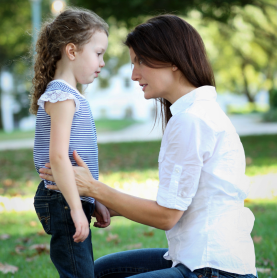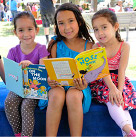5-6-21
With the upcoming return of many school-aged children to the classroom, some children and parents may feel anxiety related to the ongoing health risks associated with the pandemic.
But there are a number of healthy ways, both mental and physical, to deal with these normal concerns.
Change is a familiar source of anxiety for many of us, whether that’s a new job for an adult or a different school for a child. Altering routine can create stress for people of any age and after the pandemic dramatically impacted the way we all work, socialize and live our everyday lives, we’re now faced with adjusting yet again. Child Care Resource Center Family Well-Being Director Kelly Morehouse-Smith says children are likely to exhibit similar behaviors to their parents or care givers.
“If mom and dad are nervous, the child may be as well,” Kelly says. “We are the models for our children and show them how to react to the world or different situations. If you have a parent who is very anxious about COVID, you may see that the child has some anxiety around it.”
Situational anxiety or stress may cause some children to act out or regress in their development, Kelly says, such as a potty-trained child wetting the bed again or moving backward from other milestones. Parents may also see other behaviors like irritability, clinginess or defiance. These are likely temporary setbacks that will resolve once your child is more comfortable in the new routine of in-person learning.
“These behaviors are normal and expected,” Kelly says.
As children reintegrate into the classroom, Kelly advises parents to expect a lot of questions and to answer honestly.
“Depending on the age of the child, they may ask the same question repeatedly. They are looking for reassurance that everything will be ok,” Kelly says. “Be prepared for questions and concerns from your child and be honest without being scary. They may ask “will I get sick?” And your response might be that while it’s still possible, we’re doing what we can to keep you healthy and safe. It’s important to acknowledge their concerns without lying because they will hear it elsewhere.”
Kelly says children often fear the unknown so it can be helpful to make the return to school predictable.
“Having open conversations with your child about how the classroom may look different, things like plastic partitions, masks, smaller classroom sizes, that they won’t be able to hug friends or share food or school supplies,” Kelly says. “Acknowledging these changes in advance takes the surprise out of it and helps them to mentally prepare. Validate their worries and concerns.”
While it’s important to share these realities with children, Kelly also recommends giving them the space to be a kid and engage in activities that are deemed safe by the CDC.
“Focusing on the positives is important,” she says. “For instance, ‘I know it’s hard that you can’t hug your best friend but you can see them and talk to them.’ Don’t say ‘no, no, no.’ Focus on the things they can do instead of the things they still can’t due because of COVID.”
Routine is also key to helping children adjust. Kelly recommends preparing children early for the upcoming return to school.
“For children in general, consistency is vital,” Kelly says. “So, if you’ve gotten out of a regular routine, like if online or virtual learning is now 11 a.m. but in person learning is 8 a.m., you have to reestablish a routine: bed time, eating, waking up. That needs to be started at least a week before school resumes.”
Change can make a child feel out of control so it will be important to provide them opportunities to make choices about what happens to them wherever possible. That can be little things like having them choose between two options for a meal, which of two shirts to wear to school or what activity they’d like to do after school.
Sadness, fear and anxiety are all normal feelings for a child to experience during these uncertain times and Kelly says it’s important that parents allow their child space to share their emotions.
Parents who feel anxious should speak with other adults, such as friends or family, rather than their child. Kelly says families shouldn’t hesitate to speak with a counselor or therapist about strong feelings of anxiety or stress.
“Trust your gut – if you think your kid is having a really hard time, it may be time to reach out for help, get a mental health professional involved to provide individualized care,” Kelly says.



